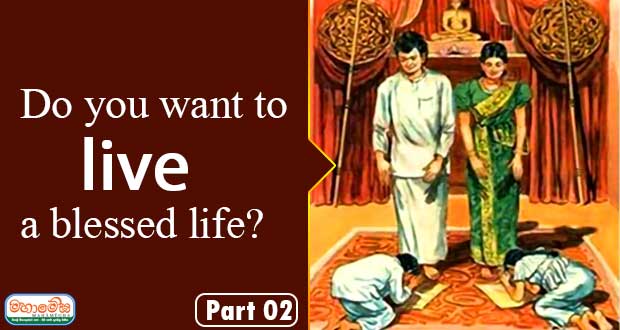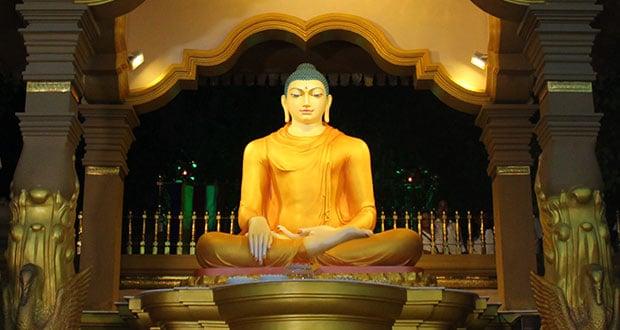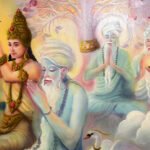Everyone likes to be blessed and live a blessed life. In order to be blessed we reach out to people or things which we believe to have the power to bless us, or we depend on our possessions as our blessings. This interpretation of ‘blessings’ not only makes us dependent on external circumstances but also cause us to ignore the consequences of our actions. In other words, the view arises that our deeds, good or bad, have no effect on our happiness/blessings, as long as some higher power blesses us and put things right. This common misconception was proven wrong when Lord Buddha, explained what blessings are in the Maha Maṅgala Sutta. The Lord Buddha expounded that blessings are actions you do, and their corresponding favorable results, with the association of noble friends, culminate in becoming an Arahant.
In last month’s edition of Mahāmegha magazine, we discussed 18 blessings in the Mahā Maṅgala Sutta, and today we will learn the remaining 20 blessings explained by the Lord Buddha. But, before that, let us recollect what we discussed last month.
Asevanā ca bālānaṁ – Not to associate with the foolish
Paṅḍitānañ ca sevanā – but to associate with the wise
Pūjā ca pūjanīyānaṁ – to honor those worthy of honor
Patirūpadesavāso ca – to live in a suitable locality
Pubbe ca katapuññatā – to have performed meritorious actions in the past
Attasammāpaṇīdhi ca – to set oneself in the right direction
Bāhusaccañca – well educated in noble Dhamma
Sippañca – knowledge of the arts and sciences
Vinayo ca – well-grounded in the discipline
Susikkhito – listening to advice and training according to the Dhamma
Subhāsitā ca yā vācā – pleasant speech
Mātāpitū upaṭṭhānaṁ – to support one’s father and mother
Puttadārassa saṅgaho – to provide for one’s wife and children
Anākulā ca kammantā – to be engaged in peaceful occupations
Dānañca – generosity
Dhammacariyā ca – righteous conduct
Ñātakānañ ca saṅgaho – to help one’s relatives
Anavajjāni kammāni – to be blameless in actions
These are 18 things we can do to create our own blessings day and night. Now let us learn the rest of the blessings explained in the Maha Maṅgala Sutta.
19). Ārati virati pāpā – To cease and abstain from evil
We are all aware that the stanza beginning with ‘Sabba pāpassa akaranaṁ…’ explain the Dispensation of the Buddha, the Buddha-Sāsana, in a nutshell. It means, ‘to abstain from all evil’. There is no place for evil or wrongdoing in the teaching of the Lord Buddha. What is wholesome and what is not is clearly explained in the noble Dhamma. One method of explanation is the Dasa Akusala Kamma– the ten unwholesome actions.
They are as follows:
Pānātipātā (killing)
Adinnādānā (taking what is not given)
Kāmēsu miccācārā (sexual misconduct)
Musāvāda (lying)
Pisunāvācā (divisive speech)
Parusāvācā (harsh speech)
Sampappalāpā (frivolous speech)
Abhijjā (covetousness; greed for others’ belongings)
Vyāpāda (ill-will, hatred)
Miccā Ditthi (wrong view)
In another instance the most compassionate Buddha explained in the Akusala Rāsi Sutta of Aṅguttara Nikāya, that the Five Hindrances are entirely unwholesome, they should be known as masses of wrong. What are the Five Hindrances?
Kāmacchanda: sensual desire
Vyāpada: feelings of hostility, resentment, and hatred
Thina middha: being lazy and lethargic in practicing the noble Dhamma
Uddhacca kukkucca: regret and restlessness of the mind
Vicikicchā: Lack of conviction or trust in the noble Dhamma
Apart from these five unwholesome states, there are the evil actions of Ānantariya kamma
The five heinous acts that cause rebirth in hell immediately after death. Also, breaking the five precepts are unwholesome actions. Further, Ayōnisōmanasikāra, contemplating in a way which arouses defilements, is wrong. Therefore, we must first learn of and then abandon the unwholesome as taught by the Buddha to be blessed in the Dispensation of the Lord Buddha.
20). Majjapānā ca saññamo – to abstain from intoxicating drinks
With the influence of western society, liquor has become a must for celebrations. To wish someone good luck, they open a bottle of Champagne. To wish good fortune at a wedding, they make a toast and ask everyone at the wedding to join in blessing the new couple by drinking. This is because the majority of humans are unaware that abstaining from consuming liquor and other intoxicants is a blessing to one’s life.
21). Appamādo ca dhammesu – to be diligent in practicing the Dhamma
Lord Buddha expounds in Anamatagga Samuttaya that this saṁsaric journey is tormenting and that we have suffered immensely in it. And when we see someone suffering a great deal, Lord Buddha advised us to think, I too have suffered like this in many births in saṁsāra, and prolonged existence in samsara would only bring about similar discomfort. Thinking thus helps us become diligent in practicing the Dhamma. We often hear people say, “I would love to practice Dhamma, but I have no leisure time.” They say so because they are oblivious to the danger of wandering in saṁsāra. The Buddha said one must hasten to realize the Dhamma just like one whose hair is on fire would hasten to put it out. So, let us make the blessing of Appamādo ca dhammesu close to our lives.
22). Gāravo ca – Paying reverence to those who are worthy of reverence.
Who are the people worthy of reverence? Elders, parents, teachers and other virtuous people. It is a shame that in present-day society respecting elders is often neglected. Buddha preached that a person who does not pay reverence to those who are worthy of reverence shall after death be reborn in a bad destination, if instead, he is reborn as a human, he shall be reborn in a low caste. Further Buddha stated a person who is respectful of ones worthy of respect shall fare on to a heavenly abode and if instead, he is reborn as a human, it shall be in high cast family.
23). Nivāto ca – humility
Being obedient to wise words and pleasant speech. Earlier we learned that pleasant speech means the Dhamma. Listening and being obedient to wise words and noble Dhamma without engaging in baseless arguments is a blessing that many do not possess, yet we should bear in mind that humility is an essential quality to progress in Dhamma.
24). Santuṭṭhī ca – contentment
Being content with what you have is a blessing. Life becomes easy and happy when we learn to be content with what we have. The world we live in tempts us with new things every day. This year there is a new phone that happens to be the best, and next year there is another, which, surprisingly, happens to be the best. If in this way we give in to our endless desires, turning like a squirrel on a wheel, we would have no time to practice Dhamma or to spend with family. When we have fewer needs, we have more time and the peace of mind to practice the Dhamma.
25). Kataññutā – gratitude
Lord Buddha once said grateful people are rare in the world. So, if you want to be an exceptional person, show gratitude; be a person who is thankful and recollects others’ help. Most people aspire to be unique and recognised, just as film stars, sportsmen, scientists, etc. But if you become a person with gratitude, then you possess a quality praised by the Buddha. Isn’t that a higher recognition than anything in the world?
26). Kālena dhammasavanaṁ – timely hearing of the Dhamma
What is the proper time to hear noble Dhamma? Is it when you have finished all your work? When are you free of responsibilities and obligations? When you have peace of mind? Once you have sort out the problems, you are dealing with right now?
In fact, the best time to hear the Dhamma is now because even if we live for 100 years, we shall not be able to find an ideal situation for listening to the Dhamma. No matter how we feel, we must listen to the Dhamma, irrespective of whether we are happy, troubled, angry, or sad because Dhamma has the power to heal us, to calm us and make us understand because it addresses the root cause of all our problems the defiled state of our mind. Therefore, if we listen to Dhamma often, we shall be fortunate to be blessed with Kālēna Dhamma Savanaṁ.
27). Khantī ca – patience
The Lord Buddha preached that patience is the greatest of virtues. What do we have to endure with patience? Heat, cold, hunger, thirst, physical suffering, harsh words, etc. Patience helps us develop many wholesome qualities essential for spiritual development, such as loving-kindness, compassion, and mindfulness. Further, if we lose patience, we may say or do things we might later regret. Therefore, being patient is a true blessing for an avid practitioner of the Dhamma.
28). Sovacassatā – obedience
When we are patient, it paves the way for obedience. If a child obeys parents and elders, he will succeed in life. Likewise, if we, the disciples of Buddha are obedient to his wise words the Dhamma we shall be successful in this life and in the afterlife.
29). Samaṇānañca dassanaṁ – meeting venerable monks
Meeting venerable monks gives us the opportunity to hear the Dhamma. Sunīta was born in the untouchable caste in India during the time of the Buddha, and his job was to clean the toilets of rich people. He had to ring a bell to notify of his presence so that others could get out of his way because he was an outcast carrying buckets of human excrement and smelled foul and dirty. One day, Sunīta seeing the Buddha coming towards him tried to veer off the road to make way, but the Buddha came straight to Sunīta and addressed him with kind words, asking if he would like to be ordained. Bewildered, yet drawn by Buddha’s compassion, Sunīta ordained as a monk and practicing ardently, soon became an Arahant. Later, even Mahā-Brahma came to pay homage to great Arahant Sunīta. How did Sunīta, the untouchable, the outcast, become a person worthy of such reverence? It is because he met the greatest Samaṇa, the Lord Buddha. Today, we have the noble Dhamma explained to us by the venerable Saṅgha. If we wish to live a blessed life, we should meet the venerable monks and learn noble Dhamma.
30). Kālena dhammasākacchā – timely discussions on the Dhamma
A diligent practitioner should meet venerable monks time and again to resolve problems he might have about virtue, samādhi, or any other aspect of the practice, and to obtain clarification and guidance through timely discussions on the Dhamma.
31). Tapo ca – suppressing evil
Practicing the Noble Eightfold Path leads to suppressing evil and thus abandoning the unwholesome and developing the wholesome through the gradual development of virtue, concentration and wisdom. As pious disciples of Buddha, we should strive to suppress evil and purify our mind of defilements.
32). Brahmacariyañca – chastity
A layperson who possesses all the Blessings we have discussed so far is suitable to leave the household life and join the order of Sangha. Then his/her life is blessed with brahmacariya: refraining from all types of sexual activities and being committed to practicing the Noble Eightfold Path. Even lay people observe the precept of abstaining from sexual activities on Poya days. If you still have not made this blessing a part of your life, you must hasten to do so.
33). Ariyasaccānadassanaṁ – understanding the Noble Truths
There is no greater blessing than realizing the Four Noble Truths. Once a person realizes the Four Noble Truths completely, he becomes an Arahant, a fully enlightened being. From here onwards the blessings explained are of the life of an enlightened one.
34). Nibbāṇasacchikiriyā ca – the realization of Nibbāna
This is the fulfillment of the third Noble Truth, realizing Nibbāna. What is Nibbāna? The Lord Buddha said the abolishing of desire is Nibbāna. Only Buddha reveals Nibbāna and the path to Nibbāna.
35). Phuṭṭhassa lokadhammehi, Cittaṁ yassa na kampati – The mind that is not touched by the ups and downs of life
There are eight worldly conditions we face in life: gain-loss, fame-defame, praise-blame, happiness-pain. While arahants are unmoved by these worldly conditions, our minds are quickly overwhelmed by these. Thus, what a blessing it must be to have a mind unruffled by the ups and downs of life.
36). Asokaṁ – the mind that is free from sorrow
We hardly spend an entire day without being sad or without having an incident that invokes sorrow in us. As long as we have defilements, even our happiness is not without its defects. We do not know what it would be like to be free from sorrow, but it is the wish of all beings.
37). Virajaṁ – taintless
Not having any defilement is called virajaṁ. As said before, many of our actions are based on defilements stemming from greed, hatred, and delusion. It is not our fault rather it is the nature of our existence. Our failure is not making use of the rare opportunity we have gotten to rid ourselves of these defilements or taints.
38). Khemaṁ – fearless
An Arahant’s mind is fearless. Whereas we can be scared easily, this is because we harbor the fetter of self-view which give rise to a feeling of insecurity that cannot be subdued. According to the Dhamma preached by the Buddha, the mind that has not realized the Noble Truths is in complete and utter darkness, just like a place without the sun or the moon or stars. Which means we do not see things for what they really are; we are living in a hallucination, and this state of existence in saṁsāra is fearsome for someone who has not realized the Four Noble Truths as he is not safe from being born in the hell worlds. Therefore, we should abide by the teachings of Buddha to free ourselves from this predicament.
These are the 38 supreme blessings expounded by the Lord Buddha. Let us try to remember the meanings of each of these blessing and be diligent in developing our practice in the noble Dhamma. Let us try to be blessed with these true blessings which lead us to Ariyasaccānadassanaṁ Seeing and realizing the Four Noble Truths.
Written by
Prajapathi Jayawardena











Recent Comments